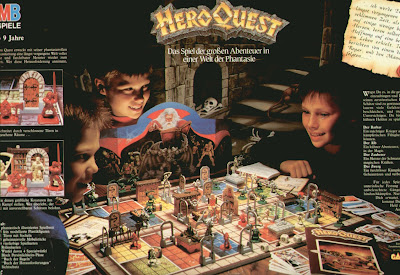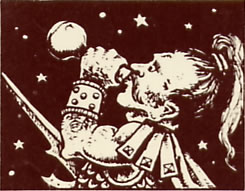HeroQuest seems to have been a game that was primarily
designed as a baby step between traditional family board games like Clue and
Sorry!, and fantasy tabletop RPGs like D&D.
Because of this, the rules are much simpler than you might expect. The problem is that dungeon crawlers are
complex by necessity, because there will often be questions that come up that
need minor rules to figure out.
For instance, the rules do not specify whether a player can
hold more than one weapon at a time.
This can lead to a player having both the most powerful ranged and melee
weapons, and becoming nearly unstoppable.
So for the sake of fixing a few broken rules in the game,
here are some changes I would make to the game:
1. A single character
can only hold one weapon per quest, however if they have purchased more than
one, they can switch weapons between quests freely.
1A. If a player picks
up a weapon in the middle of a quest, they may immediately switch to that
weapon, at the cost of leaving the other behind.
See? Already making
exceptions!
2. A player without a
weapon in hand is reduced to one attack die.
If a player has a ranged weapon, such as a crossbow, but no ammo, the
player is reduced to one combat die, and can only attack melee, just as if they
had no weapon.
2A. There is now ammo
for ranged weapons, which can be purchased at the armory.
I'm adding this rule because I always thought it was a
little silly that ranged weapons in HeroQuest had no ammo. Of course, the ammoless crossbow was intended
for the purpose of simplifying battle, but I don't think ammo adds too much
complexity. It does, however, make
ranged weapons much more costly, with having to buy ammo between every level,
and chancing running out of ammo mid-level.
The reason I am making ranged weapons such a high cost is
because, through experience, I have discovered that ranged weapons can make
players practically invincible. This
will make players seriously consider whether it's worth it to use ranged
weapons.
Also, I will have to alter the armory later to incorporate
ammo and potentially other ranged weapons.
3. Treasure: Each hero can only search for treasure once
per room. Once one treasure is found, no more heroes
may search for treasure in that room.
Originally, the rules were that all four heroes could search
once per room, regardless of outcome.
However, this has led to an overabundance of money and potions, leading,
once again, to near invincibility quickly.
With this rule in place, treasure becomes more limited.
4. Monster Cards are
not used.
 |
| "For collectors only." |
There is a set of cards that hero players may look at which
give the stats of all of the basic monsters in the game. Part of the fun of D&D is discovering how
tough monsters are through battle, so the cards are a detriment to the
experience, rather than being helpful as one might assume.
Now, beyond basic rule changes that can be summed up in a
sentence, I will make a major change to Mind Points. Typically, Mind Points are designed to be used
to break spell holds. However, in the
actual game, there is only one hero spell that effects monsters' mind points
(out of twelve total spells), rendering the stat on monsters mostly useless. There are only four out of twelve Chaos Spells
(enemy spells) that effect hero mind points.
I'll accept one third of spells using mind points as a
decent percentage, so I'll fix three hero spells to compensate:
The Earth Spell "Pass Through Rock" will have
altered text (in bold):
"This spell can be cast on any one Hero, including
yourself. That Hero may then move
through walls on his next move. He may
move through as many walls as his dice roll allows. If a
Hero ends his turn in solid rock, he must roll one combat die for each of his
mind points. For each White Shield
rolled, the Hero may move an extra square in an attempt to exit the solid rock. Caution!
If a Hero ends his turn in solid rock, he is trapped forever!"
The Air Spell "Tempest" will have altered text:
"This spell creates a small whirlwind that envelopes
one monster of your choice. That monster may roll combat dice
immediately and on future turns equal to its mind points. If a Black Shield is rolled, the spell is
broken. If the spell is not broken, the
monster can do nothing else on its turn.
If used against a monster with Zero mind points, the monster only misses
one turn."
The Fire Spell "Courage" will have altered text:
"This spell may be cast on any one Hero, including
yourself. The next time that Hero
attacks, he may roll combat dice equal
to its Mind Points, instead of Attack Dice."
With these fixes, each of the four Elemental Spell Categories
have one spell that uses Mind Points, whether it is the players' or the
monsters'. I think I will also be adding
another category or two of spells, which completely utilize Mind Points with
every spell.
This brings up a new rule that alters play:
5. Only the Elf
and Wizard may use Spells. At the
beginning of the game, the Wizard may pick one category of Spells to use for the duration of the game (not
just the quest, but the entire game).
The Elf may then pick one category to use. The Wizard may then pick two more categories
to use. The other categories will not be
used during the game.
This is similar to what the rules already state, except that
it specifies to ignore the other categories of spells. Also, the instructions are unclear as to
whether the spell selection is only for the duration of a quest, and between
quests the Elf and Wizard may reselect spells, or if the spells are permanent. I have decided to make them permanent. However, throughout the campaign I may decide
to offer opportunities for replacing spells, or adding new spells (this will
probably help for the Wizard, as he rarely gets upgrades to armor or weapons).
Next log will be some new specific items, such as armory items or spells.









